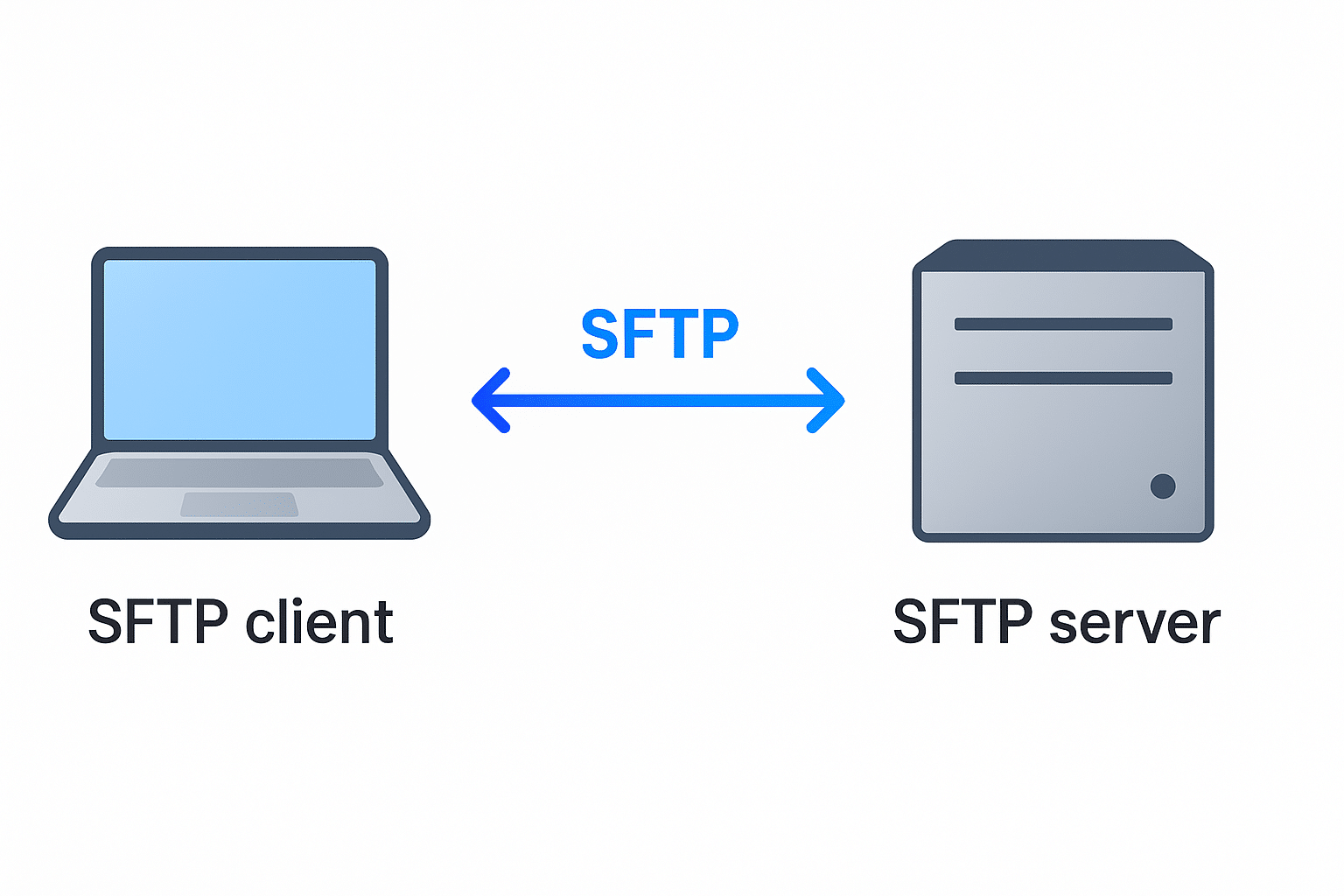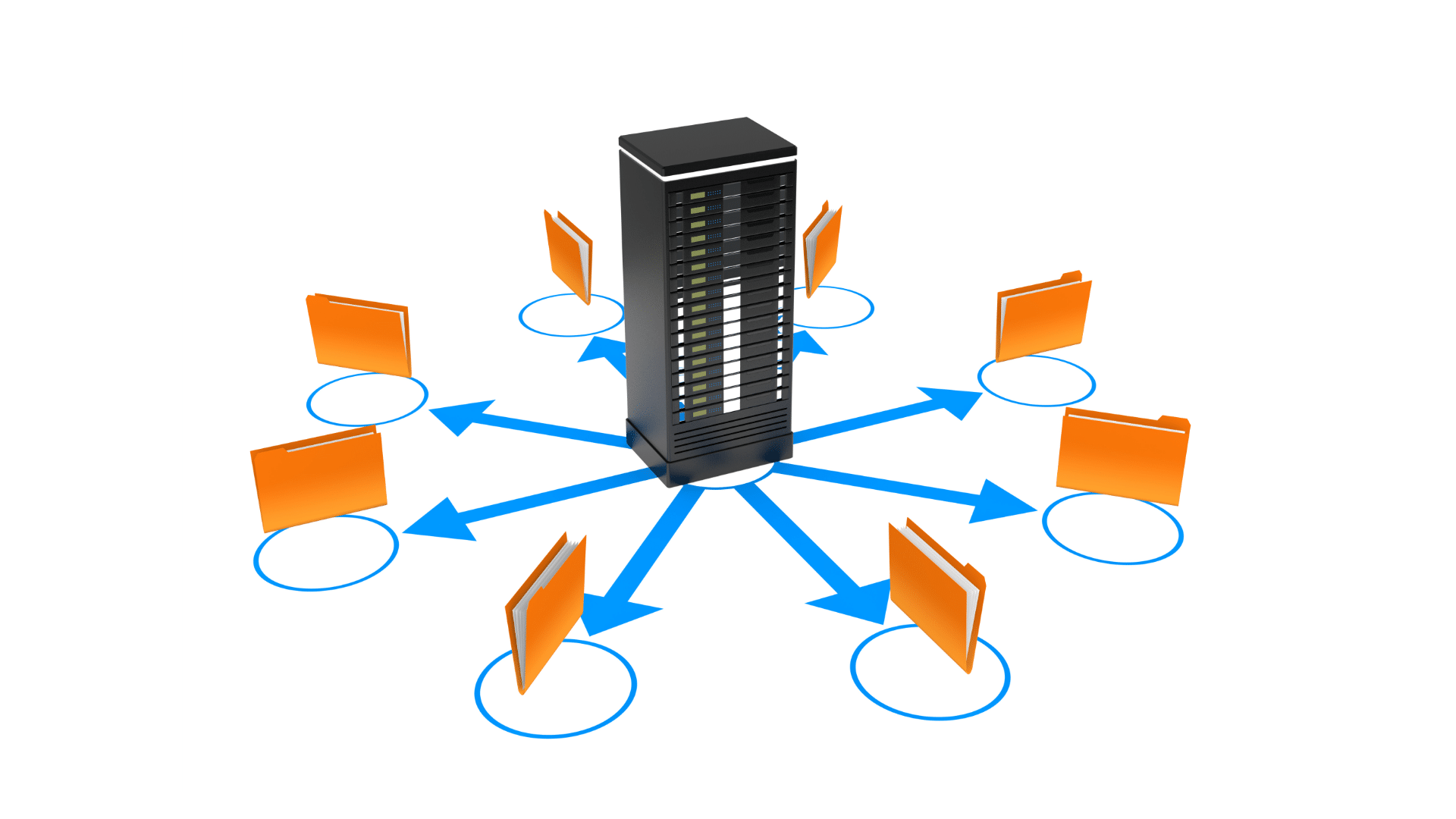Principais serviços SFTP para transferências seguras de arquivos

Looking for secure file transfer services? The basic function of SFTP services is to offer an encrypted and reliable way to move your data safely. This guide will cover the best SFTP services, their features, and how to select the right one for your security needs.
Principais conclusões
- SFTP (Secure File Transfer Protocol) utilizes SSH for secure file transfers, ensuring data encryption and integrity compared to traditional FTP.
- Key features of SFTP services include robust encryption standards, strong user authentication methods like multi-factor authentication, and automated file transfer capabilities.
- Choosing the right SFTP service involves evaluating pricing, compatibility, and scalability to meet organizational needs while ensuring secure and efficient data transfer.
- SFTP services help organizations meet compliance regulations, which are essential for adhering to legal and industry standards during data transfers.
Conteúdo
- Principais conclusões
- What Are SFTP Services?
- What is SFTP and How Does it Work?
- Key Features of SFTP Services
- SFTP Deployment Options
- Top SFTP Services
- Security Considerations for SFTP Services
- Compatibility and Integration
- Pricing and Feature Comparisons
- How to Choose the Right SFTP Service
- Common SFTP Vulnerabilities and How to Mitigate Them
- Future Trends in SFTP Services
- Resumo
- perguntas frequentes
What Are SFTP Services?

Secure File Transfer Protocol (SFTP) serves as a secure network protocol for conducting file transfers across networks, leveraging Secure Shell (SSH) to safeguard data. In contrast to FTP which sends data unprotected, the SFTP protocol applies encryption to both commands and data ensuring security of sensitive information during the transfer. Given its reliable security features, organizations handling confidential files typically prefer SFTP over traditional file transfer protocols such as FTP. The importance of SFTP in preserving the integrity and privacy of data is critical.
Employing SSH enables SFTP to create an impenetrable channel for transferring files securely through TCP port 22 which eases firewall configuration and fosters efficient protected exchange of information. By incorporating formidable encryption alongside authentication procedures, it essentially prevents unauthorized interception or access making it indispensable for any entity prioritizing secure file transmission processes.
What is SFTP and How Does it Work?

Protocolo de transferência segura de arquivos
SFTP, or Secure File Transfer Protocol, is a secure method for transferring files over a network. Unlike traditional FTP, which sends data in plain text, SFTP uses SSH (Secure Shell) to encrypt both commands and data, ensuring a secure connection for file transfers. This encryption protects sensitive information from unauthorized access during transmission.
SFTP works by establishing a secure connection between the client and the server using SSH. This connection is encrypted, ensuring that all data transferred remains confidential and secure. SFTP also supports various authentication methods, including username/password and public key authentication, to verify the identity of users and restrict access to authorized individuals only. Encryption and authentication are what makes SFTP a key solution for secure file transfers, by protecting data integrityas well as confidentiality.
Key Features of SFTP Services

SFTP services offer dependable and secure file transfers due to their implementation of comprehensive encryption methods, stringent authentication protocols, and robust access control systems. These elements guarantee that only approved users can handle confidential files via an sftp interface with the assistance of an sftp client.
The adoption of secure ftp augments these security measures, which are vital for any ftp clients utilizing such processes. Additionally, administrators can change the SFTP port number to enhance security, diminishing risks such as port scanning and potential attacks. SFTP software contributes to the efficiency by facilitating smooth and secure file transfers.
Sophisticated user management features are often integrated into SFTP solutions. For example, role-based access controls significantly contribute to overall system security. SFTP services may also provide automated functions like scheduled file transfers, which may improve service productivity and reliability in managing data transfer tasks.
Encryption Standards
File encryption is a key part of the secure file transfer protocol, keeping data safe during both its journey and when it’s stored. Secure file transfer protocols often use strong encryption standards like Advanced Encryption Standard (AES) and Triple DES. These standards help protect file transfers from digital threats and vulnerabilities. Using these powerful algorithms is crucial in defending sensitive data from potential cyberattacks, with AES being particularly popular for securing transmissions and encrypting files within SFTP services.
In today’s world, where cyber threats are increasing, applying top-notch encryption techniques like end-to-end encryption is vital to ensure that sensitive information stays protected during its journey between parties. If SFTP solutions use outdated or weak cryptographic methods, they could leave important data exposed. This is why it’s so important for SFTP services to use strong encryption practices.
Staying compliant with these rigorous standards allows secure file transfers through SFTP to provide a safe haven for sensitive information, even with the ever-changing landscape of cybersecurity challenges.
User Authentication Methods
The security of SFTP services hinges upon the effectiveness of user authentication. Multi-factor authentication (MFA) has become a standard practice to bolster this aspect. Certificate authentication is another method used to secure SFTP services, ensuring data integrity and privacy for web visitors. MFA requires that users verify their identity by providing additional forms of verification, which drastically cuts down the chances of unauthorized access. SSH keys are also leveraged as a safer substitute for credential-based logins, which reduce dependence on passwords.
SFTP services can be left vulnerable due to insufficiently secure authentication processes. Thus it’s vital to enforce strong password policies and encourage the use of strong passwords. Utilizing public key authentication serves as an advanced safeguard offering superior protection over conventional methods reliant solely on passwords.
SFTP platforms deploy stringent mechanisms for authenticating users and are therefore better equipped to protect against breaches and maintain confidentiality during file transfers. This ensures transactions involving sensitive information remain uncompromised.
SFTP Deployment Options
Hosted SFTP Solutions
Hosted SFTP solutions offer a cloud-based approach to managing secure file transfers. These solutions provide a hosted SFTP server that can be accessed from anywhere, eliminating the need for on-premises infrastructure. Hosted SFTP solutions come with several advantages:
- Secure File Transfers: Hosted SFTP solutions ensure a secure connection for file transfers, protecting data from unauthorized access and breaches.
- Escalabilidade: These solutions can easily scale to meet the growing needs of your organization, providing a flexible and reliable way to manage file transfers.
- Easy Deployment: Hosted SFTP solutions are straightforward to deploy, reducing the need for technical expertise and minimizing the time and cost associated with setting up an on-premises SFTP server.
By leveraging hosted SFTP solutions, organizations can enjoy the benefits of secure, scalable, and easily deployable file transfer capabilities without the overhead of maintaining physical infrastructure.
On-Premises SFTP
On-premises SFTP solutions provide a secure and reliable way to manage file transfers within your organization. These solutions offer several benefits:
- Control and Security: On-premises SFTP solutions give you complete control over the SFTP server, ensuring that all data remains confidential and secure within your own infrastructure.
- Costumização: These solutions can be tailored to meet the specific needs of your organization, providing a flexible and reliable way to manage file transfers.
- Integração: On-premises SFTP solutions can be seamlessly integrated with existing systems and applications, offering a cohesive and efficient way to manage file transfers.
When choosing an on-premises SFTP solutions, organizations can maintain full control over their file transfer processes, ensuring that sensitive data is handled securely and efficiently within their own environment.
Top SFTP Services

Choosing an appropriate SFTP hosting service is crucial for secure and effective file exchanges on a hosted server. Leading SFTP hosting solutions include Core SSH, MyWorkDrive, and Callback SFTP Drive.
These products each present distinct characteristics and advantages that are suited to various requirements and tastes.
CoreSSH
CoreSSH by /n software is a lightweight yet powerful solution for SSH and SFTP hosting, designed with simplicity and security at its core. Ideal for both beginners and seasoned professionals, CoreSSH delivers enterprise-grade performance with an intuitive setup process that takes just minutes.
With secure file transfers enabled right out of the box and an easy-to-use web-based UI for server management, CoreSSH eliminates the need for complex configurations while maintaining robust functionality. It supports both SFTP and full SSH shell access, enabling a wide range of use cases, from file sharing to executing remote commands and establishing secure tunnels.
What sets CoreSSH apart is its foundation on fully managed .NET code, free from dependencies on open-source components. This approach ensures a high level of security, resilience against legacy vulnerabilities, and seamless integration with the operating system’s native security infrastructure.
Backed by the trusted IPWorks toolkit, CoreSSH delivers rock-solid reliability and high performance without sacrificing ease of use. With flexible licensing — including a free Starter Edition for commercial use — and options for enterprise and FIPS 140-2 compliant deployments, CoreSSH offers a scalable, no-compromise solution for modern SSH and SFTP needs.
MyWorkDrive

MyWorkDrive excels in its job as a comprehensive secure remote access and file sharing platform. Organizations can exchange files and collaborate securely, which is particularly beneficial for companies with a workforce that operates remotely. Within it’s suite of services, MyWorkDrive offers support for SFTP to guarantee secure data transmission between on-site systems and off-site servers.
MyWorkDrive provides an extensive array of secure remote access solutions, including secure browser-based file access with Office Online editing, native mapped drive connectivity via the MyWorkDrive client without the need for a VPN, and mobile apps for iOS and Android. It integrates seamlessly with existing Windows Server environments using Active Directory and NTFS permissions, supports Single Sign-On (SSO) and multi-factor authentication, and offers flexible storage backend options including traditional SMB file shares, Azure File Shares, and cloud object storage solutions like Amazon S3—allowing organizations to retain full control over their data whether it’s on-premises or in the cloud.
At an affordable rate of $5 per user each month without any fees related to migration, MyWorkDrive presents a cost-efficient choice for organizations looking toward implementing a secure file transfer set up.
Callback SFTP Drive
Callback SFTP Drive boasts specialized capabilities, including an automated callback authentication feature that enhances security by allowing only verified users to access the drive. Compatible with a wide range of operating systems, it integrates seamlessly into existing IT environments, ensuring straightforward deployment.
Widely regarded as the best standalone SFTP drive on the market, Callback SFTP Drive allows users to map an SFTP server as a local network drive on their machine, enabling direct interaction with remote files as if they were stored locally. Users can initiate SFTP sessions directly from the command line, offering a flexible option for those comfortable with shell operations.
As a managed file transfer (MFT) solution, Callback SFTP Drive serves as a cost-effective alternative for organizations by reducing the need for intensive IT involvement and lowering overhead costs associated with file transfer processes.
With full compatibility with Windows Explorer and a variety of other file management tools, Callback SFTP Drive simplifies file operations while improving efficiency. It is especially useful for conducting secure file transfers without the complexity often associated with traditional SFTP clients.
Security Considerations for SFTP Services

When using SFTP services, the significance of secure protocols cannot be overstated. The implementation of SSH version 2 helps by offering enhanced encryption and more secure authentication processes. For encrypting data during transfer, SFTP leverages TLS to create a formidable barrier against unauthorized intrusions. Multi-factor authentication add to this defense by requiring users to supply several forms of verification before gaining entry.
It is advised to keep an eye out for potential security issues by maintaining audit trails and logs. To safeguard the integrity of sftp servers in the face of new threats, it’s also important to stay current with updates and apply patches regularly. Ensure that server configurations are done correctly, this includes setting accurate file permissions and is vital for executing secure file operations while stopping unsanctioned access to sensitive data.
Compatibility and Integration
When choosing an SFTP service, it’s important to consider how well it will work with existing systems. API integrations facilitate immediate updates through real-time data exchanges and contribute to the accuracy and consistency of data by checking for correctness in structure. This minimizes manual errors frequently seen in SFTP transactions while maintaining the integrity of the information.
The ability for the service to integrate smoothly with current IT setups, such as enterprise solutions, cloud storage options, and web services, is also crucial. Securely moving files via point-to-point transfers using secure shell (SSH) encryption is typical within these integration efforts involving an SFTP setup.
Ensuring that the chosen service can operate alongside other file transfer protocols like HTTPS bridging enhances adaptability by allowing continuous data flow over a singular port.
Pricing and Feature Comparisons
For businesses to select an appropriate SFTP service, it is essential that they comprehend both the cost structure and the capabilities provided by such services. Different SFTP services are capable of handling large files securely and efficiently, making them suitable for organizations with large scale data transfer needs.
The MyWorkDrive pricing model is around $5/user/month without any additional fees including those for data migration.
Opting for MyWorkDrive’s Web File Manager could potentially slash expenses associated with conventional VPNs and Sync/Share client support by more than half.
How to Choose the Right SFTP Service

To select an appropriate SFTP service, one must balance their particular requirements with the financial constraints of their budget. The cost of such services can differ significantly, hinging on various attributes like feature sets, storage limits, and the number of users permitted. Certain vendors extend pricing predicated on quotes which can be tailored to align with the unique needs of a business. A thorough grasp of what constitutes essential functions within SFTP is crucial for companies aiming to choose a server that ensures secure file management and data transfers using an FTP client.
Ensuring that an SFTP service is capable of scaling effectively alongside a company’s expanding file management necessities and user base is imperative. Opting for a platform with an intuitive interface contributes to reducing the amount spent on training as well as mitigating potential mistakes when handling files. Taking these considerations into account allows businesses to identify an SFTP solution that not only caters to immediate requirements but also accommodates prospective growth dynamics.
Common SFTP Vulnerabilities and How to Mitigate Them
Consistently applying updates and patches is crucial to safeguard SFTP servers from new threats. Choosing a service that provides extensive logging capabilities enables companies to monitor file transfer activities, which is essential for compliance monitoring. These detailed logs are instrumental in swiftly pinpointing and managing possible security breaches.
The introduction of stringent security practices like autenticação multifator and potent encryption techniques, particularly on the server side, can counter prevalent vulnerabilities associated with SFTP. Ensuring proper server configuration and setting appropriate file permissions also strengthens the overall protection provided by SFTP services.
By tackling these susceptibilities head-on, secure file transfers via secure file transfer protocols are guaranteed, thereby ensuring the safety of sensitive data during its transit.
Future Trends in SFTP Services
As advancements in encryption technologies happen at a rapid pace, they are set to substantially improve the security of data transferred through SFTP services in the near future. SFTP utilizes a single port (port 22) for establishing secure connections, which simplifies firewall configurations compared to traditional FTP that requires multiple ports. The application of artificial intelligence is expected to bolster threat identification and countermeasures within these services, offering enhanced protection for sensitive information.
Due to their adaptability and capacity for growth, cloud-based SFTP solutions are becoming increasingly popular across businesses, large or small. These solutions can easily match fast changing requirements related to transfers and storage, presenting a promising alternative for managing ftp servers on cloud platforms.
Future trends point to SFTP services that will integrate with additional cutting-edge functionalities designed to elevate both security measures and operational efficiency.
Resumo
SFTP services provide a robust and reliable method for secure file transfers. SFTP offers enhanced security by incorporating strong encryption, multi-factor authentication, and seamless integration capabilities, ensuring the protection of sensitive data during transit.
With top managed SFTP solutions like CoreSSH, MyWorkDrive, and Callback SFTP Drive, businesses and individuals can find the right solution to meet their specific needs. SFTP technology is continuously evolving and will remain a critical tool for secure and efficient data exchange.
perguntas frequentes
O que é SFTP?
SFTP, or SSH File Transfer Protocol, is an encrypted method for securely transferring files using SSH to ensure data protection during the transmission.
This makes it a reliable choice for maintaining confidentiality and integrity when transferring sensitive information.
How does SFTP ensure secure file transfers?
By encrypting both commands and data, as well as employing strong authentication procedures to block unwarranted access, SFTP guarantees secure file transfers and helps protect data during the transfer process. This encryption protects the confidentiality and integrity of your files while they are being transferred.
What are the key features of SFTP services?
SFTP services, often utilizing an FTP server, offer strong user authentication and robust encryption for secure data transfer, alongside access control mechanisms and automated features like scheduled file transfers.
This combination ensures both security and efficiency in managing file transfers.
How do I choose the right SFTP service?
To choose the right SFTP service, assess your specific needs and budget while prioritizing scalability, user-friendliness, and robust security features.
Unlike FTP, which lacks encryption and leaves data vulnerable, SFTP operates over SSH, providing a secure data stream for file transfers. This approach will help you find a service that meets your requirements effectively.
What are some common SFTP vulnerabilities and how can they be mitigated?
Weak authentication methods and outdated software are common vulnerabilities in SFTP. Managing IP addresses to define lists of allowed or blocked IP addresses is crucial for ensuring secure file transfers and controlling user access.
To mitigate these risks, ensure regular software updates, implement multi-factor authentication, and configure servers properly.


